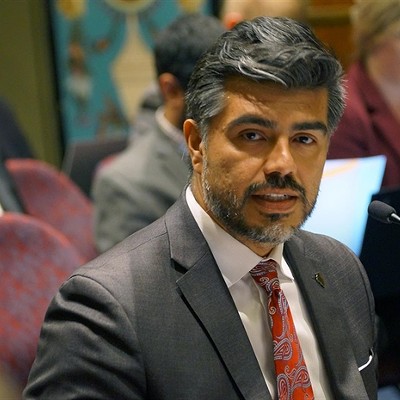Many downstate mayors want a greater voice in deciding the details of their cities’ firefighter and police pensions plans.
Springfield Mayor Mike Houston led a press conference April 30 at the Capitol where 24 mayors and village presidents met to request that the General Assembly do something about downstate public safety pensions which are busting city budgets all over the state.
Costs of police and fire pensions have grown over recent years, causing local towns and cities to carry a greater burden. Unfunded liability, or future payment obligations, for municipal pension funds outside of Chicago have increased from about $300 million for fire and about $400 million for police in 1987 to $3.5 billion for fire and $4.8 billion for police in 2012.
City leaders say soaring pension costs are partly due to “sweeteners” made to police and fire pensions. Mt. Vernon Mayor Mary Jane Chesley said “sweeteners” include the 3 percent compounded cost of living increases police and firefighters receive on their pensions. Another benefit is a change in the formula that increases benefits for those who have worked more than 20 years. A third benefit Chesley pointed out is the “survivor benefit,” which means a surviving spouse receives 100 percent of the retiree’s pension.
To reduce pension costs on communities, the leaders suggested lowering the cost of living adjustment and increasing the retirement age.
Springfield has about $225 million of assets and $225 million of unfunded liabilities in its fire and police pensions systems combined, Houston said. In the 90s, the city’s funds were funded at 90 percent or more of the payment obligations, but that number is now closer to 50 percent for both police and fire pension systems. Under a 2011 state law, all municipal pension funds must be balanced at a minimum of 90 percent by 2040.
Houston said he wants people to understand that communities do not have control over public safety pension benefits. The state controls benefits through mandates, and local municipalities have to figure out a way to fund them.
Chicago’s funds are in the worst shape. Houston speculated that negotiations were happening to propose legislation to help Chicago public safety systems before the spring session concludes.
“We anticipate and must insist that downstate police and fire pensions be dealt with in the same manner as Chicago police and fire pension funds,” Houston said.
The mayors also voiced their opposition to legislation waiting for a vote in the Senate, House Bill 5485, or the “minimum manning” bill. It would require that minimum staffing levels at fire departments be a part of collective bargaining discussions.
Decisions about minimum manning would likely be left up to an arbitrator, which village and city leaders are concerned will lead to greater costs for communities.
Houston said Springfield has had minimum staffing levels for more than 30 years. Every time a person calls in sick or takes a vacation day, someone must be called in to replace them, which costs the city more. He said it should be up to local municipalities to decide the rules regarding the costly daily operations, rather than the state.
“These decisions should be made at the local level by the people who have been elected, the people in the communities, to determine what level of protection is needed and can be afforded,” Houston said.
If changes to the “sweeteners” aren’t made and the minimum manning bill passes, the leaders said communities will either have to increase revenues, which means tax increases, or make cuts.
The Illinois Municipal League is supporting the mayors’ push for change. Some union leaders, however, say fire and police benefits aren’t the source of the municipalities’ funding issues. Pat Devaney, president of the Associated Fire Fighters of Illinois, said a 2011 study released by the Commission on Government Forecasting and Accountability showed the primary causes to the pension funding issue were the effects of the market decline, poor investment decisions and a lack of contribution by municipalities.
“We support changes to address the issues, but what we won’t support is benefit changes or the idea that they have caused the problems,” he said.
The Associated Fire Fighters oppose the mayors’ recommendation to decrease benefits and support the minimum manning bill, which Devaney argued will save tax dollars because a state law would reduce time spent on local negotiations and court cases brought against municipalities by local fire organizations in regard to staffing requirements.
Contact Lauren P. Duncan at [email protected].
Mayors want relief from public safety pensions
[
{
"name": "Air - MedRect Combo - Inline Content 1",
"component": "11490391",
"insertPoint": "3",
"requiredCountToDisplay": "1",
"parentWrapperClass": "fdn-ads-inline-content-block"
},{
"name": "Air - MedRect Combo - Inline Content 2",
"component": "11490392",
"insertPoint": "7",
"requiredCountToDisplay": "5",
"parentWrapperClass": "fdn-ads-inline-content-block"
},{
"name": "Air - MedRect Combo - Inline Content 3",
"component": "11490393",
"insertPoint": "12",
"requiredCountToDisplay": "9",
"parentWrapperClass": "fdn-ads-inline-content-block"
}
]
Illinois Times has provided readers with independent journalism for almost 50 years, from news and politics to arts and culture.
Your support will help cover the costs of editorial content published each week. Without local news organizations, we would be less informed about the issues that affect our community..
Got something to say?
Send a letter to the editor and we'll publish your feedback in print!















